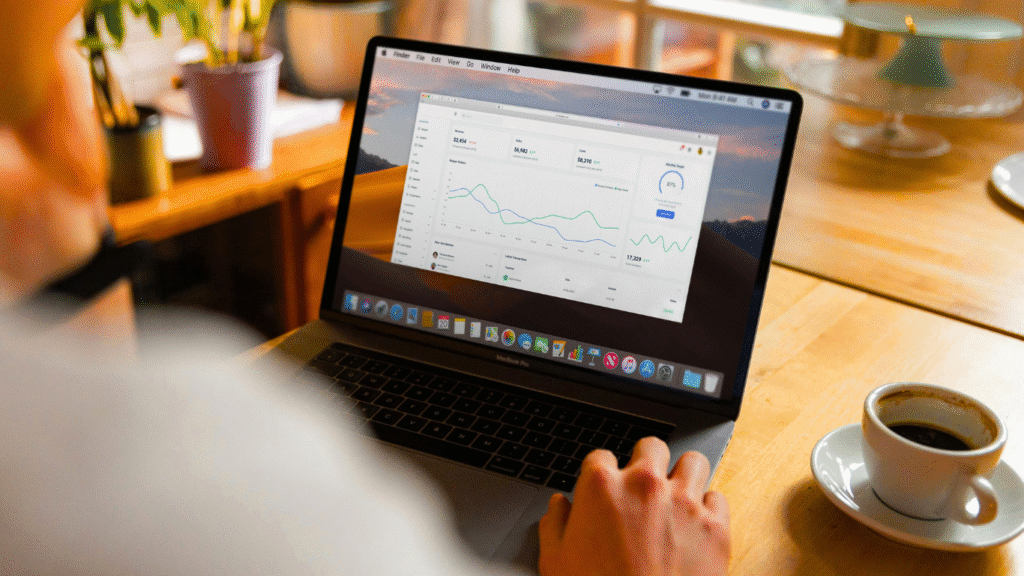What is the Future of Digital Marketing in 2025?

Introduction:
As we move into a more connected and technologically advanced world, the future of digital marketing in 2025 presents a landscape shaped by artificial intelligence, immersive experiences, ethical data usage, and personalization at scale. With rapid innovation, consumer behavior is evolving, and marketers must adapt quickly.
In this comprehensive guide, we’ll explore the key trends, technologies, and strategies that define what the future of digital marketing in 2025 looks like and how businesses can stay ahead of the curve.
1. AI-Powered Personalization Becomes the Norm
One of the most transformative forces in digital marketing is Artificial Intelligence (AI). In 2025, personalization will no longer be a nice-to-have it will be an expectation.
Predictive Analytics at Scale
AI algorithms will analyze user behavior in real-time, predicting needs before consumers express them. Imagine a customer getting a product suggestion based on not just past purchases, but mood, location, and time of day.
Dynamic Content Creation
Marketers will rely on AI tools like ChatGPT, Jasper, or Copy.ai to generate dynamic content that resonates with individual segments. From email campaigns to landing pages, AI will create hyper-relevant messages that drive conversions.
2. Voice and Visual Search Dominate SEO
In 2025, how users search for information will be vastly different. The rise of voice assistants and visual search is changing SEO strategies from keyword stuffing to natural language understanding and multimedia optimization.
Voice Search Optimization
Smart speakers and mobile assistants like Siri, Alexa, and Google Assistant will influence over 50% of all search queries. That means focusing on conversational keywords, FAQ-style content, and schema markup to stay visible.
Visual Search and Image Recognition
With platforms like Google Lens and Pinterest Lens gaining popularity, brands must optimize image metadata and adopt visual SEO strategies to appear in visual search results.
3. The Metaverse and AR/VR Marketing
What is the future of digital marketing in 2025 without mentioning the Metaverse and immersive experiences?
Marketing in Virtual Worlds
Brands are already building virtual storefronts in platforms like Decentraland and Roblox. By 2025, this will become mainstream. Expect product demos in VR, avatar-based customer service, and live virtual events.
Augmented Reality for Retail
AR will enhance online and offline shopping experiences. Brands like IKEA and Sephora are already using AR to let customers visualize products in real-time. In 2025, expect AR to be integrated into every e-commerce site.
4. Hyper-Personalized, Omnichannel Customer Journeys

In 2025, consumers won’t tolerate generic ads or disconnected brand experiences. They expect consistent messaging across every touchpoint from mobile apps to email to in-store interactions.
Connected Marketing Ecosystems
With tools like HubSpot, Salesforce, and Adobe Experience Cloud, marketers can orchestrate seamless journeys across devices and platforms. AI will ensure messages are timely and personalized, based on real-time customer data.
Contextual Engagement
Push notifications, SMS, and emails will be tailored not just to preferences but context like weather, current events, or nearby locations creating a more responsive experience.
5. Cookieless Future and Data Privacy
With the death of third-party cookies and rising data regulations (GDPR, CCPA, etc.), digital marketers must adopt first-party data strategies and respect consumer consent.
Emphasis on First-Party Data
Brands will prioritize collecting data directly from users via surveys, polls, email signups, and loyalty programs. This data will be stored securely and used to build better customer experiences.
Transparency and Trust
Consumers are more privacy-aware than ever. In 2025, companies that are transparent about how they collect and use data will gain a competitive edge.
6. Short-Form Video and Live Streaming Lead Content Strategy
Thanks to platforms like TikTok, Instagram Reels, and YouTube Shorts, short-form video is king. In 2025, this format will dominate content marketing across industries.
Algorithm-Friendly, Snackable Content
Quick, impactful videos under 60 seconds will help brands stay relevant and increase engagement. Creative storytelling, behind-the-scenes content, and authentic moments will perform best.
Interactive Live Streaming
Live commerce will grow exponentially. Brands will host live product launches, Q&A sessions, and interactive demos, turning viewers into buyers in real time.
7. Influencer and Creator-Led Marketing Evolution
In 2025, the creator economy will be worth billions. Brands will move from traditional ads to authentic collaborations with micro and nano influencers.
Micro-Influencers, Major Impact
Small creators (1,000–100,000 followers) with niche audiences deliver high engagement and trust. These influencers will become critical partners for targeted campaigns.
Branded Content Integration
Rather than product placement, creators will co-create content that aligns with their voice and values, giving brands organic reach without feeling like ads.
8. Conversational Marketing with Chatbots and Messaging
The question “What is the future of digital marketing in 2025?” would be incomplete without highlighting chatbots and conversational AI.
AI Chatbots Are the New Sales Reps

In 2025, intelligent chatbots will handle product recommendations, bookings, and customer service across websites, apps, and social platforms 24/7 often indistinguishably from humans.
Messaging Platforms as Sales Channels
WhatsApp, Messenger, and Telegram will become powerful direct-to-consumer sales tools, offering everything from product catalogs to checkout functionality right in the app.
9. Sustainable and Ethical Marketing Takes Center Stage
Modern consumers demand more than just good products—they want brands to reflect their social and environmental values.
Eco-Friendly Messaging
In 2025, successful digital marketing campaigns will highlight sustainability efforts, carbon neutrality, and responsible sourcing. Transparency and honesty will be key.
Inclusive and Ethical Branding
Representation, diversity, and inclusion will move from buzzwords to brand pillars. AI tools will help ensure marketing materials are ethically created and inclusive.
10. The Rise of Zero-Click Content and SERP Features
Getting clicks is harder than ever with Google’s increasing use of featured snippets, knowledge panels, and instant answers.
Optimize for Zero-Click Visibility
In 2025, content that answers questions directly on the SERP will perform better. Use structured data, rich snippets, and FAQ sections to increase visibility.
Focus on Content Value
Value-driven content such as ultimate guides, comparison tools, and calculators—will encourage longer dwell times and signal quality to search engines.
How Can Businesses Prepare for 2025?
As we look ahead to the future of digital marketing in 2025, businesses must embrace innovation while remaining agile, data-driven, and deeply customer-centric. The marketing landscape is evolving rapidly, and success depends on proactively adapting to new technologies and consumer expectations.
Here are five essential strategies to prepare your business for what lies ahead:
1. Invest in AI Tools for Automation and Personalization
Artificial Intelligence will be at the core of successful marketing strategies in 2025. From automated ad campaigns to personalized email flows and customer journey mapping, AI enhances efficiency and relevance.
- Use machine learning to predict user behavior.
- Automate repetitive tasks like segmentation and A/B testing.
- Deploy chatbots for real-time customer support and lead nurturing.
2. Build a First-Party Data Strategy for a Cookieless Future
With third-party cookies being phased out, collecting and owning your own customer data is critical.
- Encourage newsletter signups, loyalty program participation, and interactive content (like quizzes) to gather data.
- Use Customer Data Platforms (CDPs) to unify and analyze first-party data securely.
- Always maintain transparency and comply with privacy regulations like GDPR and CCPA.
First-party data provides a foundation for trust, personalization, and long-term customer relationships
3. Adopt Video, AR, and Immersive Content
Engagement will be driven by immersive and interactive formats. In 2025, audiences will expect content that is not only relevant but also experiential.
- Create short-form videos for platforms like TikTok, YouTube Shorts, and Instagram Reels.
- Use AR tools to let users try products virtually.
- Explore virtual events or branded spaces in the Metaverse to build community and awareness.
Immersive content boosts engagement, emotional connection, and conversion rates.
4. Focus on Ethical, Sustainable Branding
Consumers are more socially and environmentally conscious than ever. Brands that reflect these values will earn loyalty and differentiation.
- Highlight sustainability initiatives and ethical sourcing.
- Ensure your campaigns are inclusive and culturally sensitive.
- Use your platform to support social causes aligned with your brand values.
In 2025, authenticity and responsibility will define brand success.
5. Optimize for Voice, Visual, and Zero-Click Searches
Search is evolving beyond typed queries. To stay visible, businesses must align with how users interact with content today:
- Optimize for voice search with conversational language and long-tail keywords.
- Ensure your images are SEO-ready with alt text and structured data.
- Focus on featured snippets and FAQ content to win zero-click results on Google.
Visibility in 2025 will depend on how well you adapt to emerging search behaviors.
Conclusion: Adapting to the Future of Digital Marketing in 2025
So, what is the future of digital marketing in 2025? It’s a dynamic, fast-paced, and AI-driven landscape where immersive experiences, personalization, and ethical branding take center stage. The digital space is no longer just about visibility—it’s about meaningful engagement.
The brands that will lead in 2025 are not just the most innovative—they’re the most adaptable. Success will come to those who:
- Embrace emerging technologies like AI, AR, and voice search.
- Build real, human connections through personalized and interactive content.
- Prioritize consumer trust by protecting data and acting with integrity.
Digital marketing in 2025 isn’t about keeping up with trends—it’s about anticipating them. It’s about creating strategies that resonate with your audience’s evolving needs, values, and expectations.
As we enter this new era, marketers must focus less on volume and more on value. The future belongs to brands that understand their customers deeply and deliver experiences that are relevant, responsive, and responsible. see it
